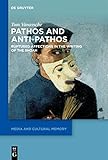Pathos and Anti-Pathos : Ruptured Affections in the Writing of the Shoah / Tom Vanassche.
Material type: TextSeries: Media and Cultural Memory ; 36Publisher: Berlin ; Boston : De Gruyter, [2022]Copyright date: ©2023Description: 1 online resource (XII, 375 p.)Content type:
TextSeries: Media and Cultural Memory ; 36Publisher: Berlin ; Boston : De Gruyter, [2022]Copyright date: ©2023Description: 1 online resource (XII, 375 p.)Content type: - 9783110757743
- 9783110758702
- 9783110758580
- 809.93358 23/eng/20230201
- online - DeGruyter
- Issued also in print.
| Item type | Current library | Call number | URL | Status | Notes | Barcode | |
|---|---|---|---|---|---|---|---|
 eBook
eBook
|
Biblioteca "Angelicum" Pont. Univ. S.Tommaso d'Aquino Nuvola online | online - DeGruyter (Browse shelf(Opens below)) | Online access | Not for loan (Accesso limitato) | Accesso per gli utenti autorizzati / Access for authorized users | (dgr)9783110758580 |
Browsing Biblioteca "Angelicum" Pont. Univ. S.Tommaso d'Aquino shelves, Shelving location: Nuvola online Close shelf browser (Hides shelf browser)
Diss. Universität Freiburg 2021.
Frontmatter -- Acknowledgements -- Contents -- List of abbreviations -- A note on translations and transliterations -- Introduction: Setting the stage -- 1 The pathos of anti-pathos -- 2 Describing emotions: Metaphorical oppositions and their ambiguities -- Part One: Pathos and anti-pathos and the ‘risks’ of encyclopaedic and documentary fiction -- Introduction -- 3 W. G. Sebald: Melancholia, nostalgia and the pathos of empathy -- 4 Dieter Schlesak: The pathos of anti-pathos and the pathos of the ‘real’ in testimony and in the documentary tradition -- Part Two: The survivors’ pathos of anti-pathos: Autobiography and historiography -- Introduction -- 5 Ruth Klüger: An (ant)agonistic pathos of anti-pathos -- 6 Raul Hilberg: The historian’s affective self-control -- In lieu of a conclusion. Summary and further questions -- Bibliography -- Index
restricted access online access with authorization star
http://purl.org/coar/access_right/c_16ec
Scholarship often presumes that texts written about the Shoah, either by those directly involved in it or those writing its history, must always bear witness to the affective aftermath of the event, the lingering emotional effects of suffering. Drawing on the History of Emotions and on trauma theory, this monograph offers a critical study of the ambivalent attributions and expressions of emotion and “emotionlessness” in the literature and historiography of the Shoah. It addresses three phenomena: the metaphorical discourses by which emotionality and the purported lack thereof are attributed to victims and to perpetrators; the rhetoric of affective self-control and of affective distancing in fiction, testimony and historiography; and the poetics of empathy and the status of emotionality in discourses on the Shoah. Through a close analysis of a broad corpus centred around the work of W. G. Sebald, Dieter Schlesak, Ruth Klüger and Raul Hilberg, the book critically contextualises emotionality and its attributions in the post-war era, when a scepticism of pathos coincided with demands for factual rigidity. Ultimately, it invites the reader to reflect on their own affective stances towards history and its commemoration in the twenty-first century.
Issued also in print.
Mode of access: Internet via World Wide Web.
In English.
Description based on online resource; title from PDF title page (publisher's Web site, viewed 25. Jun 2024)









